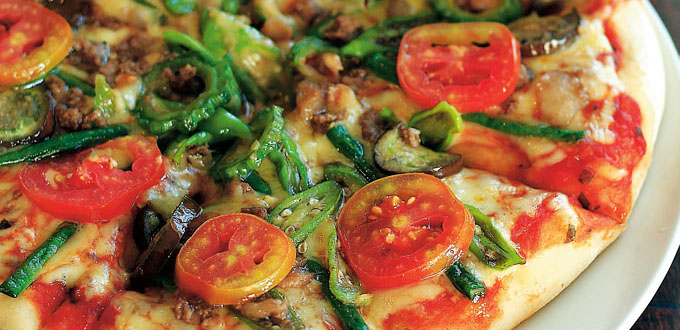Of bitter food, drink, soul and cup
Yesterday, a sister at church posted a picture of pinakbet pizza. Filipinos love pinakbet, a dish of mixed vegetables steamed in fish or shrimp sauce, with bagoong. In addition to veggies such as eggplant, tomato, okra, squash, string beans, chili peppers, and winged beans, it also has ampalaya (Scient. momordica charantia, Span. amargoso), a very bitter veggie, hence the name bittermelon.
 I like pinakbet, except that I hate ampalaya, otherwise known to me as “ampala-yuck” (apologies to my Filipino friends). My wife always points out the various alleged health benefits of ampalaya, such as lowering blood sugar, cholesterol, blood pressure, even cancer prevention. But my brother-in-law in California says he prefers to just take his prescription medicine.
I like pinakbet, except that I hate ampalaya, otherwise known to me as “ampala-yuck” (apologies to my Filipino friends). My wife always points out the various alleged health benefits of ampalaya, such as lowering blood sugar, cholesterol, blood pressure, even cancer prevention. But my brother-in-law in California says he prefers to just take his prescription medicine.
 Being a pastor, I usually explain to my wife what the Bible says about bitter food and drink and bitterness in general. So here’s a short word study, just for fun. But not to worry, I won’t preach a sermon on this subject.
Being a pastor, I usually explain to my wife what the Bible says about bitter food and drink and bitterness in general. So here’s a short word study, just for fun. But not to worry, I won’t preach a sermon on this subject.
Before turning against me for slandering this Filipino favorite, read on.
Old Testament
The root word for bitter or bitterness in the Old Testament is marah, the most well-known use being Naomi’s word when she went back to Bethlehem a forlorn woman who lost everything in the land of Moab, “Don’t call me Naomi. Call me Mara, because the Almighty has made my life very bitter” (Ru 1:20).
The word bitter is used literally for bitter food and drink, as when the Israelites came to an oasis in the desert, but “they could not drink the water of Marah because it was bitter; therefore it was named Marah“ (Ex 15:23; see also Ex 12:8, Nm 9:11, “bitter herbs”; Nm 5:18-27, “water of bitterness” test for adultery; Prv 5:4, bitter wormwood; Prv 27:7, “to one who is hungry everything bitter is sweet”).
But it is used more often figuratively in many ways: sin and wickedness are bitter (Dt 32:32; Job 13:26; Jer 2:19, 4:18; Am 6:12); bitter mourning (Ezk 27:31; Am 8:10); the Chaldeans are a bitter (cruel) nation (Hab 1:6); life under slavery is bitter (Ex 1:14); bitter wine as judgment (Isa 24:9); bitterness associated with poison as judgment (Dt 29:18; 32:24; Jer 8:14, 9:15, 23:15); bitter complaint (Job 23:2); bitter lamentation (Jer 6:26, 31:15; Lam 3:5, 19; Est 4:1); bitter and angry feelings (2 Sm 17:8; Prv 31:6)
New Testament
In the New Testament, the Greek verb is pikraino (“to embitter”), adjective is pikros (“bitter”), and the noun is pikria (“bitterness”). These are used in Acts 8:23 for Simon the magician’s evil intention as the “gall of bitterness”; Colossians 3:19 (husbands are not to embitter their wives); James 3:14 (“bitter jealousy”); Hebrews 12:15 (“root of bitterness,” resentful attitude of one who turns away from God); Revelation 8:11, 10:9, 10 (judgment as bitter wormwood and scroll).
Therefore, from this short word study, there is nothing pleasant or good that the Bible says about bitter food and drink, and bitterness of soul. But the “yuck factor” ends here.
Jesus was given chole, wine “mixed with gall,” a bitter mixture, to numb his senses at the crucifixion (Mt 27:34; see also Mk 15:23, “wine mixed with myrrh”).
The night before his death, our Lord prayed to his Father for his people. But he also agonized so greatly over the hellish suffering that he faces, so he prayed, “My Father, if it be possible, let this cup pass from me; nevertheless, not as I will, but as you willâ€Â (Matt 26:39). The bitter drink that was first offered to him is a picture of the bitter cup that he was about to drink to accomplish his Father’s will for him.
The second cup offered to him by the soldiers signified the cup overflowing with God’s wrath against the sins of his people. Even so, he willingly drank it, knowing what this cup means, the cup of the LORD’s wrath (Psa 78:15).
Christ suffered extreme thirst and drank the bitter cup of God’s wrath in order that he may offer us the cup of salvation filled with water unto eternal life that would satisfy our thirst forever (Mt 26:26; Lk 22:19).
This is the only consolation for me when I’m forced to eat pinakbet, pizza or not. I’m always reminded of our Lord Jesus Christ who turned our bitter mourning over sin into joyful dancing by drinking of the bitter cup of God’s wrath for us.
